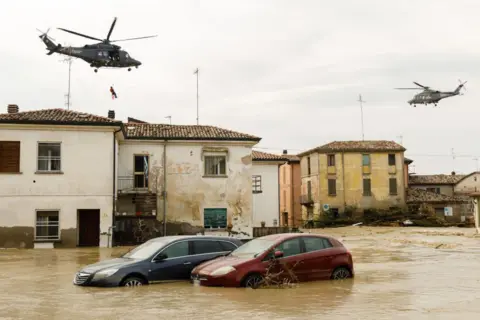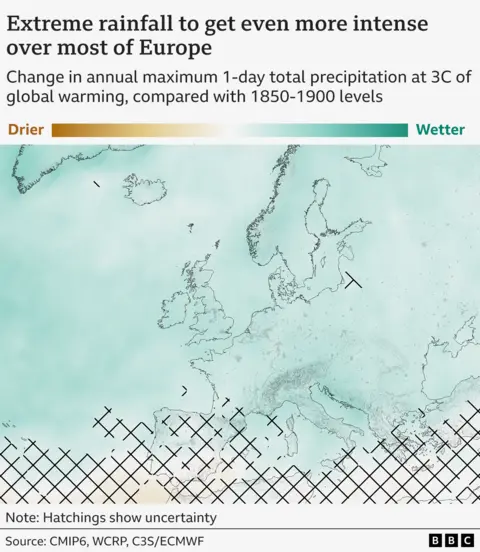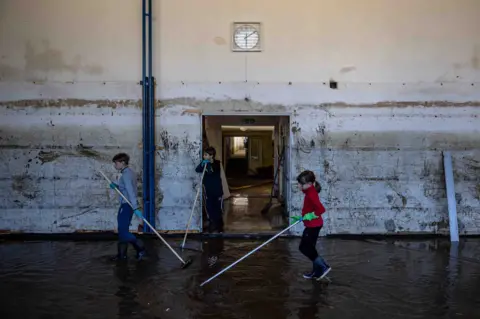Local residents rescue a woman from rising flood waters in the Romanian village of Slobozia Conachi
Central Europe’s devastating floods were made much worse by climate change and offer a stark glimpse of the future for the world’s fastest-warming continent, scientists say.
Storm Boris has ravaged countries including Poland, the Czech Republic, Romania, Austria and Italy, leading to at least 24 deaths and billions of pounds of damage.
The World Weather Attribution (WWA) group said one recent four-day period was the rainiest ever recorded in central Europe – an intensity made twice as likely by climate change.
On a positive note, the storm was well forecast, meaning some regions were better prepared for it, likely avoiding more deaths.
Scientists at WWA work out how much of a role climate change played in an extreme weather event by comparing it with a model of how bad that storm, drought or heatwave might have been in a world where humans hadn’t been burning fossil fuels for nearly 200 years.
 Getty
Getty
The Italian army evacuates citizens from the hamlet of Traversara after the Lamone river burst its banks
The kind of rainfall unleashed by Boris is thankfully still rare – expected to occur about once every 100-300 years in today’s climate, which has warmed by about 1.3C due to greenhouse gas emissions.
But if warming reaches 2C, similar episodes will become an extra 5% more intense and 50% more frequent, the WWA warned.
Without more ambitious climate action, global warming is expected to reach around 3C by the end of the century.
“This is definitely what we will see much more of in the future,” said Friederike Otto, senior lecturer in climate science at Imperial College London and co-author of the WWA study.
“[It] is the absolute fingerprint signature of climate change […] that records are broken by such a large margin.”
The record rains fit into the broader pattern of how Europe’s climate is changing in a warming world.
Europe is the fastest-warming continent. The last five years were on average around 2.3C warmer than the second half of the 19th Century, according to the Copernicus climate service.
This not only brings much more frequent and intense heatwaves, but also more extreme rainfall, particularly over north and central Europe. The picture is more complicated in southern Europe, due to shifts in large-scale weather patterns.
The simplest reason for more intense rainfall in a hotter world is that a warmer atmosphere can hold more moisture – about 7% for every 1C. This extra moisture can lead to heavier rainfall.

‘Stalling’ weather systems
One reason Boris has produced so much rain is that the weather system got ‘stuck’, dumping huge amounts of water over the same areas for days.
There is some evidence that the effects of climate change on the jet stream – a band of fast-flowing winds high up in the atmosphere – may make this ‘stalling’ phenomenon more common. But this is still up for debate.
Even if we don’t get more ‘stalled’ weather systems in the future, climate change means that any that do get stuck can carry more moisture and therefore be potentially disastrous.
“These weather patterns occurred in a warmer climate because of our greenhouse gas emissions, [so] the intensity and volume of rainfall was larger than it would have otherwise been,” explains Richard Allan, professor in climate science at the University of Reading.
 EPA
EPA
Children clean a flooded school in the village of Ceska Ves, Czech Republic
Weather forecasts are continually improving, and in this case the huge levels of rainfall that triggered the floods were forecast several days in advance.
That meant flood preparations could be put in place.
That’s partly why the death toll was not as bad as previous major flooding in 1997 and 2002, even though the recent rain was heavier in many places and the floods covered a larger area.
“There has been a lot of money spent after the previous two floods to [install and update] the flood defences,” explains Mirek Trnka of the Global Change Research Institute in the Czech Republic, one of the countries most affected by the flooding.
In the city of Brno, for example, where Prof Trnka is based, not all of the flood defences had been completed, but the advanced warning allowed authorities to strengthen areas where there was still work to be done.
Not everywhere in Europe has been as fortunate. The EU has pledged €10bn (£8.3bn) in emergency repairs to help affected areas.
“It shows just how expensive climate change is,” says Dr Otto.
Over recent decades, improved flood protection has largely shielded communities from increased impacts.
But there are concerns that rising temperatures – and so ever increasing extreme rainfall – could make them ineffective.
“The [severity of the] flood events is going to increase considerably in the future, so if you keep the flood protections at the same level as they are today, the impacts may become unbearable for societies in Europe,” explains Francesco Dottori of IUSS in Pavia, Italy.
There is of course a clear way to stop these rainfall events from getting ever worse – cutting emissions of planet-warming gases such as carbon dioxide.
“Our simulations show that if you are able to keep future global warming below 1.5C, which is one of the targets of the Paris agreement, then future flood damage will be cut by half compared to the [business as usual] scenario,” Dr Dottori adds.
Otherwise, we know what will happen to these events in the future, Prof Allan says.
“The intensity of rainfall and these weather events will only get worse.”
Map by Muskeen Liddar.
Source link : http://www.bing.com/news/apiclick.aspx?ref=FexRss&aid=&tid=66f44563ccc44ae0b93dc0a799ae2670&url=https%3A%2F%2Fwww.bbc.com%2Fnews%2Farticles%2Fcn5zx2zx5xvo&c=6721337663041229760&mkt=de-de
Author :
Publish date : 2024-09-24 20:06:00
Copyright for syndicated content belongs to the linked Source.



